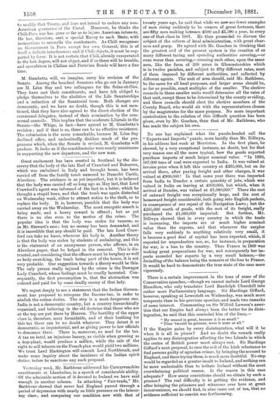Yesterday week, Mr. Rathbone addressed his Carnarvonshire constituents at Llandudno,
in a speech of considerable ability. Of the admirable section of it devoted to Ireland we have said -enough in another column. In attacking " Fair-trade," Mr. Rathbone showed that never had England passed through a • -period of depression with nearly so little pressure on the labour- ing • class ; •and comparing our condition now -with that of twenty years ago, he said that while we now-see fewer examples of men rising suddenly to be owners of .great fortunes, there are fifty-men making between £500 and£1,500 a year, to every one of that class in 1861. He then proceeded to discuss the subject of the reform of local administration, with great clear- ness and grasp. He agreed with Mr. Goschen in thinking that the greatest evil of the present system is the creation of so many different taxing and spending authorities covering,—or even worse than covering,—crossing each other, upon the same area, like the farm of 200 acres in Gloucestershire which is in twelve parishes, and subject to fifty different rates, most of them imposed by different authorities, and collected by different agents. The unit of area should, said Mr. Rathbone, be the same for all local purposes, and larger areas should be, as far as possible, exact multiples of the smaller. The elective councils in these smaller units would determine all the rates of that unit, except those to be determined by the county or riding,. and these councils should elect the elective members of the- County Board, who would sit with the representatives chosen by the magistrates for the same purpose. No more important contribution to the solution of this difficult question has been given, even by Mr. Goschen, than that of Mr. Rathbone, who has made the subject his own.






































 Previous page
Previous page